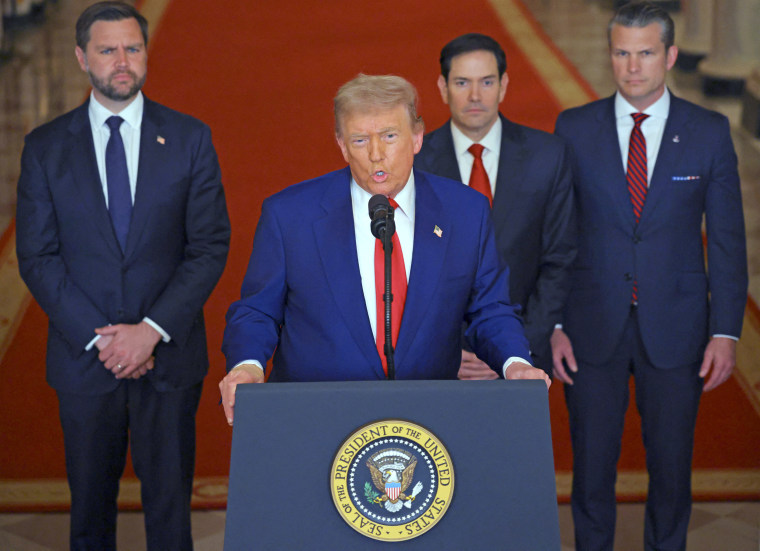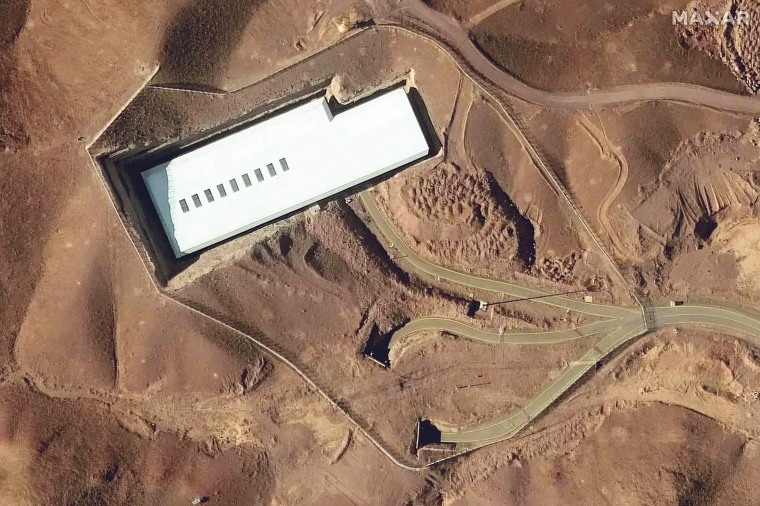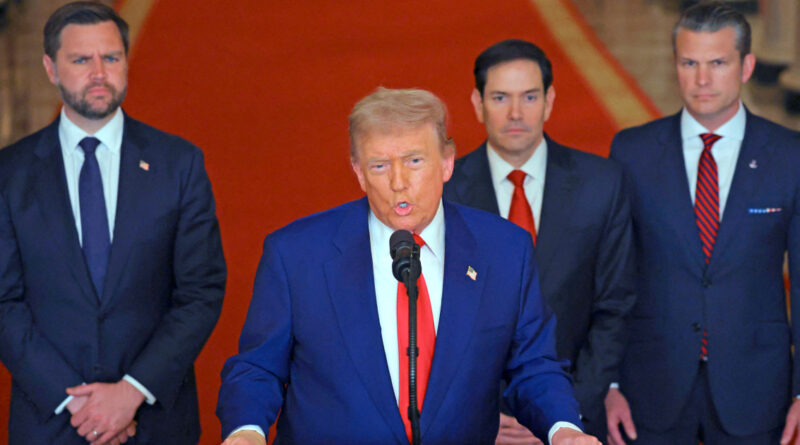U.S. strikes Iranian nuclear sites, Trump says
President Donald Trump said that Iran’s major nuclear enrichment facilities were “completely and totally obliterated” after the United States dropped bombs on them Saturday night — and warned that American forces would carry out further hostilities if Tehran does not negotiate a peace settlement.
The airstrikes on the Fordo, Natanz and Esfahan nuclear sites are the first time the United States has conducted a direct military attack on Iran, and they further escalated a military conflict between Iran and Israel that began on June 13.
“There will be either peace or there will be tragedy,” Trump said in a nationally televised address from the White House, with Vice President JD Vance, Defense Secretary Pete Hegseth and Secretary of State Marco Rubio flanking him. “Remember there are many targets left. … [I]f peace does not come quickly, we will go after those other targets with precision, speed and skill.”
Trump first announced the strikes in a Truth Social media post at 7:50 p.m. ET.
At the White House, Trump thanked God, the military and Israeli Prime Minister Benjamin Netanyahu, saying U.S. officials “worked as a team” with their counterparts in Tel Aviv.
Netanyahu, in his first public comments on the U.S. strikes, congratulated Trump for his “bold decision to target Iran’s nuclear facilities with the awesome and righteous might” of the American military.
The decision will “change history,” Netanyahu said in an English-language video statement.
In a brief phone interview with NBC News’ Kristen Welker, Trump called the strikes a “great success” and a “complete and total success.”
A gamble by Trump
Trump’s decision to bomb Iran represents a gamble that U.S. military action against Tehran’s nuclear program can remain limited in scope and that the United States will not be drawn into another open-ended war in the Middle East.
Trump and his aides appear to have calculated that the U.S. action did not mean opening the door to a long-term military assault on Iran and that a one-off strike could deal a decisive blow to Iran’s nuclear ambitions.
U.S. military commanders have not yet outlined the possible damage to Iran’s nuclear sites, including a deeply buried facility in Fordo believed to hold enriched uranium and sophisticated centrifuges. If the bombing was less than precise or if Iran moved key nuclear-related hardware, U.S. aircraft could still be ordered back to finish the job.
Even if the bombing raids hit their targets, the decision to attack Iran carries risks and uncertainties.

If Trump’s gamble pays off, Iran’s nuclear capabilities will be set back years and possibly decades. Iran could find itself severely weakened, having suffered a series of devastating blows over the past year from Israel’s military and intelligence operations.
But Iran has a history of striking at more powerful adversaries by using asymmetric tactics, including terrorist attacks. In 1983, Washington accused Iran of using Lebanese Hezbollah militants to carry out lethal bombings of a Marine Corps barracks and the U.S. Embassy in Beirut.
With both Israel and the United States bombing its territory and Israel’s government suggesting Iran’s government might collapse, Iran’s political leaders are likely to see the current conflict as a fight for the survival of their regime.
Iran has said it has a right to self-defense if it is attacked, and it could be looking to strike at U.S. bases or embassies in and outside the region. Iran still has ballistic and cruise missiles that it could try to fire at American bases in the Persian Gulf or elsewhere, a scenario the U.S. military has long prepared for.
It’s not clear whether Iran could retaliate with missile attacks on U.S. or allied forces in the Gulf. Israel has managed to intercept many of the ballistic missiles and drones that Iran has fired over the past week, though its air defenses are coming under increasing strain.
Iranian officials could choose a more drastic response by planting sea mines or attacking commercial ships in the Strait of Hormuz, the narrow waterway between the Persian Gulf and the Indian Ocean through which a fifth of the world’s oil passes.
Such a move could cause havoc in the oil markets and the global economy. But it would also disrupt Iran’s own oil exports, depriving the country’s struggling economy of badly needed oil revenue. And it could antagonize other countries that have so far stayed out of the conflict.
Iran had long counted on its proxy forces in the region as a defensive ring to fend off its enemies and deter any possible attack by Israel or the United States.
But its most important ally, Hezbollah in Lebanon, has been devastated by a series of Israeli attacks and assassinations. And in the Palestinian enclave of Gaza, Hamas — which Iran armed and trained — has been badly weakened and its leaders killed.
But Tehran still has Shiite militias in Iraq and Houthi militants in Yemen that could possibly target American forces, including in Syria.
The New York Police Department said in a statement that it was putting officers at sensitive locations around the city in the wake of the U.S. action.
“We’re tracking the situation unfolding in Iran,” the statement said. “Out of an abundance of caution, we’re deploying additional resources to religious, cultural, and diplomatic sites across NYC and coordinating with our federal partners.”
Partisan reaction
House Minority Leader Hakeem Jeffries, D-N.Y., attacked Trump’s decision to strike Iran, saying “the risk of war has now dramatically increased.”
“President Trump misled the country about his intentions, failed to seek congressional authorization for the use of military force and risks American entanglement in a potentially disastrous war in the Middle East,” Jeffries said in a statement.
Tommy Vietor, who served as a National Security Council spokesperson during the Obama administration, warned of retaliatory attacks by Tehran against the U.S.
“Iran might retaliate today, tomorrow or in months. Or a year from now, Iran or its proxies might blow up a bus filled with American tourists in Cyprus,” Vietor wrote in a social media post. “No one knows what comes next. Bombing Iran started something that we no longer have the capacity to predict or contain.”
Republican members of Congress said in social media posts that they supported Trump’s decision to bomb the three nuclear sites in Iran.
Sen. Lindsey Graham of South Carolina said, “Good. This was the right call. The regime deserves it.”
Sen. Ted Cruz of Texas said the attack was necessary. “The prospect of the Iranian regime acquiring nuclear weapons represents the most acute immediate threat to America and our allies,” he said.
Sen. John Cornyn of Texas called Trump’s actions “courageous and correct” and Sen. Rick Scott of Florida said the president’s actions show “what peace through strength looks like.”
Focus on Fordo site
The facility at Fordo, Iran’s most advanced, is built inside a mountain and believed to be safe from any bomb except for the United States’ GBU-57 Massive Ordnance Penetrator (MOP), a “bunker buster” weapon.

Trump did not say which type of bombs were used in the strikes, but it was widely expected that the GBU-57 would be used. Earlier in the day, several American B-2 stealth bombers, which are the only plane that can carry GBU-57 bombs, which weigh 30,000 pounds, took off from Whiteman Air Force Base in Missouri.
Trump’s turn
NBC News has reported that Trump initially opposed Israel taking military action against Iran, favoring negotiations over bombing. But in the days before Israel’s strikes on Iran, he became convinced that Israel’s heightened anxiety over Iran’s nuclear enrichment capabilities was warranted.
After a pivotal June 8 briefing from the chairman of the Joint Chiefs of Staff, Air Force Gen. Dan Caine, about Israel’s plans and U.S. options for supporting its operation, Trump gave tacit approval for Israel to conduct strikes and that the U.S. would provide limited backing.
Even though many of his MAGA allies have advocated against U.S. military involvement, Trump’s rhetoric about Iran has steadily escalated since Israel’s bombing campaign began.
On Tuesday, in a post on his social media platform Truth Social, he called for Iran’s “UNCONDITIONAL SURRENDER!”
Wednesday morning, he said he was still considering U.S. strikes.
“I may do it. I may not do it,” he told reporters outside the White House. “Nobody knows what I’m going to do.”





